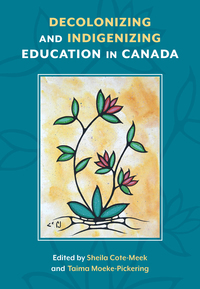
An expansive collection of essays exploring the complexities of decolonization and the Indigenization of education will be launched Thursday, June 25 at 11 a.m. with a free webinar. The book, Decolonizing and Indigenizing Education in Canada (Women’s Press, Canadian Scholars’ Press, 2020) is co-edited by York University Vice-President of Equity, People and Culture Sheila Cote-Meek, and Laurentian University Professor Taima Moeke-Pickering.
Seeking to advance critical scholarship on issues including the place of Indigenous epistemologies, knowledges, curriculum, and pedagogy, Decolonizing and Indigenizing Education in Canada aims to build space in the academy for Indigenous peoples and resistance and reconciliation. This 18-chapter collection is built around the two connecting themes of Indigenous epistemologies and decolonizing postsecondary institutions. Aiming to advance and transform the Canadian academy, the authors of this volume discuss strategies for shifting power dynamics and Eurocentric perspectives within higher education.

Written by academics from across Canada, the text reflects the critical importance of the discourse on truth and reconciliation in educational contexts and how these discourses are viewed in institutions across the country. This expansive resource is essential to students and scholars focusing on Indigenous knowledges, education and pedagogies, and curriculum studies.
Decolonizing and Indigenizing Education in Canada will be formally launched today during a free Zoom webinar hosted by Women’s Press and Canadian Scholars’ Press.
To register for this event, visit https://us02web.zoom.us/webinar/register/WN_bGuWtupvRzOV1T6E0OXs-w. All are welcome.
The webinar will be moderated by Mark Solomon, dean of Students & Indigenous Education at Seneca College and will feature opening remarks by York University President and Vice-Chancellor Rhonda L. Lenton. Both Cote-Meek and Moeke-Pickering will speak about the book, its purpose and importance in postsecondary education. Contributing authors Keri Cheechoo and Patricia McGuire will also give remarks.
About the speakers
Professor Sheila Cote-Meek (Anishnaabe-Kwe) is the Vice-President, Equity, People and Culture at York University. She has worked in higher education for 30 years and has extensive experience leading Indigenous initiatives as well as senior academic faculty relations experience. She has led several successful strategic initiatives which are aimed at creating more equitable and inclusive environments for Indigenous peoples.
Professor Taima Moeke-Pickering is a Maori of the Ngati Pukeko and Tuhoe tribes. She is a full professor in the School of Indigenous Relations at Laurentian University, Sudbury, Ontario where she teaches courses on Indigenous research methodologies, international Indigenous issues, and United Nations and Indigenous social work. Her Ph.D used a decolonizing methodology to evaluate Indigenous-based programs. Dr. Moeke-Pickering is an author of numerous articles dedicated to promoting Decolonization strategies, social change, and Indigenous well-being. She has extensive experience working with international Indigenous communities, women empowerment, evaluative research, big data analysis, and photovoice methodologies.
Keri Cheechoo (she/her), an Iskwew from the community of Long Lake #58 First Nation, is an emergent Cree scholar who situates her pedagogy through both a praxis of ethical relationality, and her Nisgaa methodological framework which is framed by protocol, mamatowisin, or engaging inner mindfulness, and reciprocity. A published poet and an assistant professor of education in the Faculty of Education at the University of Ottawa, Cheechoo uses poetic inquiry (an arts-based methodology) in a way that connects her spiritual aptitude for writing with educational research. Cheechoo seeks to share the missing histories, and the intergenerational and contemporary impacts of colonial violence on Indigenous women’s bodies, as a part of her commitment to the educational and reconciliation process toward Indigenizing school curricula.
Patricia McGuire is a professor at Carleton University’s School of Social Work. She has worked in direct practice and with postsecondary and Indigenous institutes. McGuire is Anishinaabe Wiisaakodewikwe. She is affiliated with Bingwi Neyaashi Anishinaabe and has community connections at Kiashke Zaaging Anishinaabe. A consistent theme in her work is creating respectful frameworks for including Anishinaabe knowledge(s) in broader academic, social and political contexts. McGuire has written peer-reviewed articles and co-edited First Voices – An Aboriginal Women’s Reader (2009). Her research program is in Indigenous knowledge(s), resilience, healing practices, safe spaces and community resurgence, as well as ethical research with Indigenous people.

























